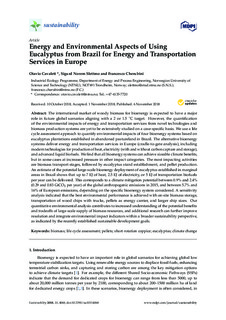| dc.contributor.author | Cavalett, Otávio | |
| dc.contributor.author | Slettmo, Sigurd Norem | |
| dc.contributor.author | Cherubini, Francesco | |
| dc.date.accessioned | 2019-02-11T14:08:38Z | |
| dc.date.available | 2019-02-11T14:08:38Z | |
| dc.date.created | 2018-11-06T15:51:25Z | |
| dc.date.issued | 2018 | |
| dc.identifier.citation | Sustainability. 2018, 10 (11), . | nb_NO |
| dc.identifier.issn | 2071-1050 | |
| dc.identifier.uri | http://hdl.handle.net/11250/2584848 | |
| dc.description.abstract | The international market of woody biomass for bioenergy is expected to have a major role in future global scenarios aligning with a 2 or 1.5 °C target. However, the quantification of the environmental impacts of energy and transportation services from novel technologies and biomass production systems are yet to be extensively studied on a case-specific basis. We use a life cycle assessment approach to quantify environmental impacts of four bioenergy systems based on eucalyptus plantations established in abandoned pastureland in Brazil. The alternative bioenergy systems deliver energy and transportation services in Europe (cradle-to-gate analysis), including modern technologies for production of heat, electricity (with and without carbon capture and storage), and advanced liquid biofuels. We find that all bioenergy systems can achieve sizeable climate benefits, but in some cases at increased pressure in other impact categories. The most impacting activities are biomass transport stages, followed by eucalyptus stand establishment, and pellet production. An estimate of the potential large-scale bioenergy deployment of eucalyptus established in marginal areas in Brazil shows that up to 7 EJ of heat, 2.5 EJ of electricity, or 5 EJ of transportation biofuels per year can be delivered. This corresponds to a climate mitigation potential between 0.9% and 2.4% (0.29 and 0.83 GtCO2 per year) of the global anthropogenic emissions in 2015, and between 5.7% and 16% of European emissions, depending on the specific bioenergy system considered. A sensitivity analysis indicated that the best environmental performance is achieved with on-site biomass storage, transportation of wood chips with trucks, pellets as energy carrier, and larger ship sizes. Our quantitative environmental analysis contributes to increased understanding of the potential benefits and tradeoffs of large-scale supply of biomass resources, and additional research can further improve resolution and integrate environmental impact indicators within a broader sustainability perspective, as indicated by the recently established sustainable development goals. | nb_NO |
| dc.language.iso | eng | nb_NO |
| dc.publisher | MDPI | nb_NO |
| dc.relation.uri | http://www.mdpi.com/2071-1050/10/11/4068/pdf | |
| dc.rights | Navngivelse 4.0 Internasjonal | * |
| dc.rights.uri | http://creativecommons.org/licenses/by/4.0/deed.no | * |
| dc.title | Energy and Environmental Aspects of Using Eucalyptus from Brazil for Energy and Transportation Services in Europe | nb_NO |
| dc.title.alternative | Energy and Environmental Aspects of Using Eucalyptus from Brazil for Energy and Transportation Services in Europe | nb_NO |
| dc.type | Journal article | nb_NO |
| dc.type | Peer reviewed | nb_NO |
| dc.description.version | publishedVersion | nb_NO |
| dc.source.pagenumber | 18 | nb_NO |
| dc.source.volume | 10 | nb_NO |
| dc.source.journal | Sustainability | nb_NO |
| dc.source.issue | 11 | nb_NO |
| dc.identifier.doi | 10.3390/su10114068 | |
| dc.identifier.cristin | 1627667 | |
| dc.description.localcode | © 2018 by the authors. Licensee MDPI, Basel, Switzerland. This article is an open access article distributed under the terms and conditions of the Creative Commons Attribution (CC BY) license (http://creativecommons.org/licenses/by/4.0/). | nb_NO |
| cristin.unitcode | 194,64,25,0 | |
| cristin.unitname | Institutt for energi- og prosessteknikk | |
| cristin.ispublished | true | |
| cristin.fulltext | original | |
| cristin.qualitycode | 1 | |

